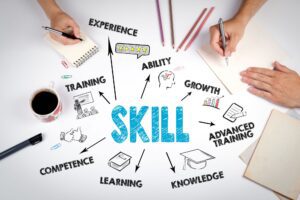Artificial intelligence (AI) is rapidly changing the world, and it’s not just by creating new technologies.
Recent research shows that the worldwide AI market is to reach USD$244 billion in 2025, and this is expected to rise further in the coming years. This indicates that more industries are using it to simplify tasks and speed up processes. (1)
However, while AI offers exciting possibilities, it also raises serious concerns. Some experts have even warned that it could lead to market meltdowns in fast-moving sectors like finance. This brings us to a crucial realisation: as AI continues to take over routine tasks, the real value lies in the professional skills only humans can bring. (2)
For professionals, the goal shouldn’t be to compete with AI but to discover how to use it to their advantage. Here’s why skills matter and how they can shape a future where humans and AI work side by side:
Critical Thinking and Complex Problem Solving
AI can process big data and uncover patterns at remarkable speed. However, it lacks the human ability to apply context, draw on life experience, or navigate grey areas in real time. Critical thinking and problem solving skills allow professionals to assess situations thoughtfully, ask the right questions, and make well-informed decisions.
Complex issues call for analytical thinking, flexibility, and sound judgment. Workers who can break down layered problems, consider multiple viewpoints, and apply logic help maintain balance in competitive environments. These soft skills also reduce dependence on automation by reinforcing the value of human insight in the era of AI.
Some organisations are responding to this need through targeted skill development. For example, Working Voices professional skills courses and other similar programmes include training in critical thinking and structured problem solving. This helps professionals build essential skills for better decision-making in AI-driven workplaces.
Emotional Intelligence and Collaboration
Emotional intelligence is the ability to understand your emotions and those of others. It’s key in leadership, teamwork, and communication. Machines may simulate conversation, but they don’t feel empathy. They can’t respond to emotional cues or work through challenges using understanding or compassion.
Professionals with high emotional intelligence build better relationships. They know how to manage stress, support their team members, and respond with care during challenging moments. These skills are the foundation of healthy interpersonal communication and effective conflict resolution.
As awareness of emotional intelligence grows, more individuals seek ways to strengthen it through reflective learning. Programmes like The Sustainable Human masterclass, among others, encourage participants to explore how self-awareness and empathy can shape stronger personal and professional connections. These sessions are one example of how emotional intelligence is being nurtured through intentional, people-focused development.
Creativity and Innovation
AI is excellent at repeating patterns but may not be as creative. It doesn’t generate fresh ideas or take bold, creative leaps. Innovation often begins with curiosity and a willingness to explore the unknown, whether it’s designing a new product, reshaping a business model, or improving the user experience.
This is precisely why human creativity remains indispensable. Strengthening creativity is one of the most effective ways to protect your job from AI disruption. Professionals must continuously develop their skills and apply their innovative abilities to remain relevant in an evolving workplace.
Ethical Reasoning and Judgment
AI can follow instructions, but may not understand right from wrong. Ethical choices require values, awareness, and real-world thinking. For example, when generative AI is used to create text, images, or audio, we risk spreading false information or unfair ideas. This is why human oversight matters.
Strong ethical reasoning helps professionals make sound choices. It looks at privacy, fairness, and responsibility with care. Its role in decision-making ensures that AI tools support people rather than create harm.
Adaptability and Lifelong Learning
AI keeps evolving, and professionals need to stay curious, adjust to new roles, and learn to use new tools when needed. People who can shift their thinking and remain calm during uncertain times are more likely to succeed.
Lifelong learning is a big part of this mindset. Professionals who participate in training programs, enrol in online courses, or seek professional development are better prepared for change.
Digital literacy leads the way in integrating AI and human abilities, boosting efficiency and productivity. In fact, a 2023 survey by Deloitte revealed that over 90% of business leaders believe technology is vital for their organisation’s success. This highlights the growing need for adaptable professionals who are willing to learn and ready to shape the future of work. (3)
Conclusion
AI will continue to grow in power and influence, changing the way we work and solve problems. However, it can’t replace the human qualities that make teams strong and businesses successful. As we move into a future shaped by AI, professionals must learn how to use technology to support their work while continuing to build the skills that machines lack.
